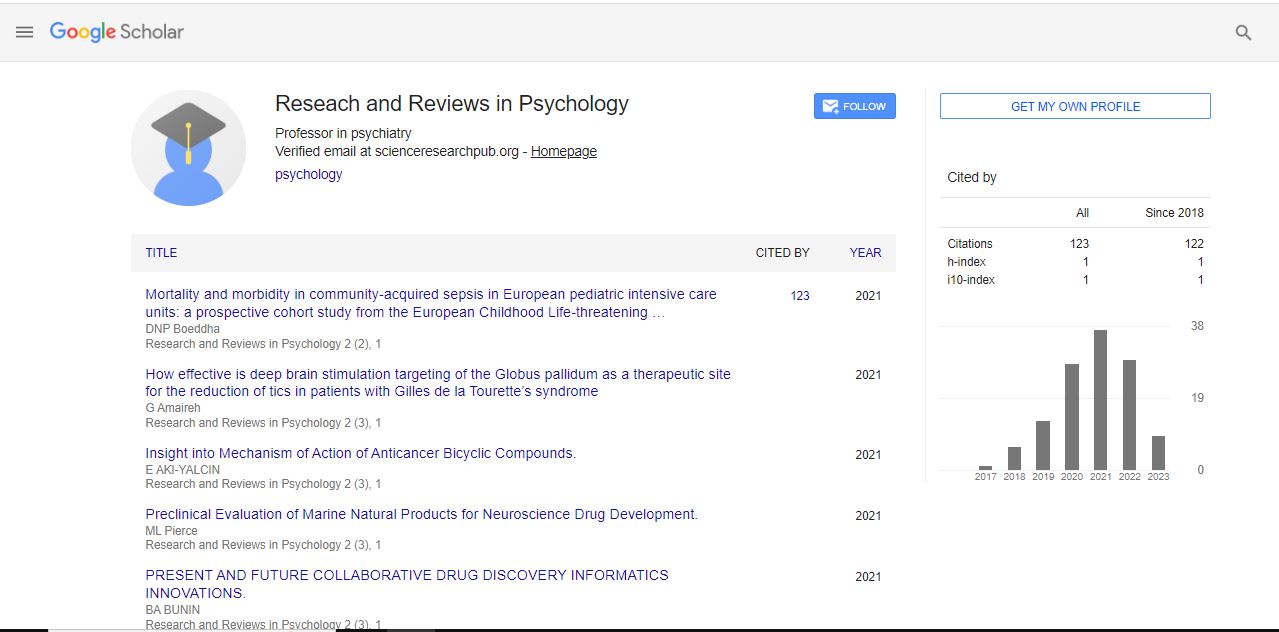Commentary, Res Rev Phys Vol: 4 Issue: 3
Principles, Influential Theories, Practical Applications of Forensic Psychology
Okada Masato*
1Department of Psychiatry, Keio University, Tokyo, Japan
*Corresponding Author: Okada Masato,
Department of Psychiatry, Keio
University, Tokyo, Japan
E-mail: masato.o@gmail.com
Received date: 02 September, 2023, Manuscript No. RRPY-23-117755;
Editor assigned date: 04 September, 2023, PreQC No. RRPY-23-117755 (PQ);
Reviewed date: 18 September, 2023, QC No. RRPY-23-117755;
Revised date: 25 September, 2023, Manuscript No. RRPY-23-117755 (R);
Published date: 05 October, 2023 DOI: 10.4172/rrpy.1000349.
Citation: Masato O (2023) Principles, Influential Theories, Practical Applications of Forensic Psychology. Res Rev Phys 4:3.
Description
Forensic psychology is a captivating and multidisciplinary field that lies at the intersection of psychology and the legal system. It explores the intricate relationship between the human mind and the criminal investigation system, aiming to provide valuable insights into criminal behavior, the legal process, and the rehabilitation of individuals.
Forensic psychology is a specialized branch of psychology that focuses on the application of psychological principles to the legal and criminal investigation system. It encompasses various aspects, including the assessment and treatment of criminal offenders, the evaluation of eyewitness testimony, the profiling of criminals, and the assessment of the mental state of defendants.
Influential theories in forensic psychology
Forensic psychology has contributed to several influential theories that provide valuable insights into criminal behavior and the legal process:
Psychopathy: Psychopathy, as a personality disorder, is a central concept in forensic psychology. Psychopaths exhibit a lack of empathy, impulsivity, and a penchant for manipulation. Researchers such as Robert Hare have contributed to understanding of psychopathy.
Criminal profiling: Criminal profiling involves constructing profiles of unknown criminals based on behavioral and psychological characteristics. Profilers such as John E. Douglas have shaped this field.
Eyewitness testimony: Forensic psychology research has revealed the fallibility of eyewitness testimony and has contributed to understanding of memory and perception errors, as well as factors influencing witness reliability.
Competency to stand trial: The assessment of an individual's competency to stand trial is a significant aspect of forensic psychology. The Dusky v. United States case established the standard for competency assessment.
Risk assessment: Forensic psychologists employ risk assessment tools to evaluate the likelihood of criminal behavior, violent tendencies, and the potential for reoffending.
Criminal responsibility: The concept of criminal responsibility explores whether an individual was aware of the criminality of their actions at the time of the conduct. It has critical implications in legal insanity defenses.
Applications of forensic psychology
Forensic psychology has a wide range of practical applications within the legal system:
Criminal profiling: Profilers create profiles of unknown offenders, aiding law enforcement in identifying suspects and understanding criminal behavior patterns.
Expert testimony: Forensic psychologists provide expert testimony in court cases related to mental health, criminal responsibility, and other psychological factors.
Witness evaluation: Forensic psychologists assess the credibility of eyewitnesses, uncover factors that may influence their testimony, and help to identify potential inaccuracies in their accounts.
Correctional psychology: Forensic psychologists work in correctional facilities, evaluating and treating inmates, addressing mental health issues, and designing rehabilitation programs.
Risk assessment: Forensic psychologists assess the risk of violent behavior and recidivism, assisting the legal system in making decisions regarding parole, sentencing, and release.
Current trends and future directions
Forensic psychology continues to evolve, with emerging trends and areas of focus:
Neurocriminology: The field of neurocriminology explores the neurobiological factors that may contribute to criminal behavior, providing insights into the relationship between brain function and criminal tendencies.
Terrorism and extremism: The study of terrorism and extremism has gained prominence, with forensic psychologists contributing to understanding the psychology of radicalization and de-radicalization.
Trauma-informed care: The incorporation of trauma-informed care within the criminal investigation system emphasizes a more compassionate and rehabilitative technique to working with trauma survivors who have been involved in criminal activity.
 Spanish
Spanish  Chinese
Chinese  Russian
Russian  German
German  French
French  Japanese
Japanese  Portuguese
Portuguese  Hindi
Hindi 